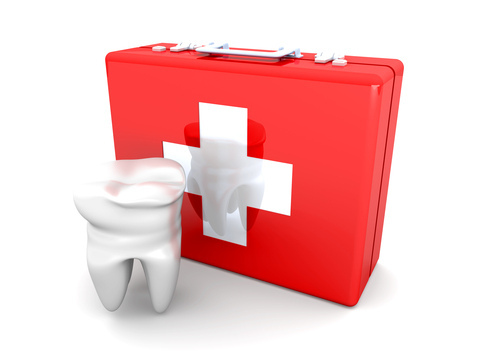Our Blog
Are braces right for me?
December 17th, 2014

According to Preferred Consumer, it's estimated that 50 percent of people around the world have teeth that are crooked, not aligned properly, or irregular. Fortunately today, orthodontics has advanced to the point where corrective devices, such as braces and retainers, are less obvious, more comfortable, and can be worn for shorter periods of time.
So, with that being said, how do you know if braces are right for you? Typically your dentist will be able to point out any issues with your teeth at your regular six-month cleanings and recommend you to an orthodontist. But here are some other things to keep in mind when deciding whether or not braces could be in your future:
Crooked Teeth
As children grow, so do their teeth. And more often than not, certain teeth will grow in crooked. This isn't uncommon, as the majority of children will require some sort of teeth correction, whether that’s braces or retainers. Retainers are custom-made devices that either work to hold teeth in place or correct tooth alignment. They're often worn all day, aside from meals, at the start of the treatment period and then eventually are rolled back so they're just worn at night. Braces on the other hand are worn for at least a year and work to help straighten or position teeth.
Overbite or Underbite
The other main oral issue that orthodontics helps correct is uneven alignment, such as an underbite or an overbite. You might hear Drs. Cherie Nicolucci and Stephanie Mai refer to this as a "malocclusion," which means "bad bite." Braces can help rearrange your alignment so an overbite or underbite is less of a problem. Typically after the braces come off for this sort of treatment, patients need to wear a retainer from Nicolucci Orthodontics to finish the treatment.
While braces are typically associated with dental issues in children, more adults are wearing the devices as well. About one in every five braces wearers are adults; a sign that it's never too late to correct any oral issues. Part of this is due to the technological advancements in orthodontics. For instance, new braces feel much better and come in a variety of styles — including clear — so they're far less obvious. Plus, the wires on braces are now made from advanced metals, which are stronger and lighter, so they get the job done much more efficiently. With so many people wearing braces these days, nicknames like "metal mouth" and "brace face" are almost a thing of the past. What's more, is that insurance plans are increasingly covering orthodontic treatment, making braces a much more feasible option for families on a budget.
When weighing whether or not braces are in your future, it's important to study all of your options about the styles of braces and what treatment option is best for you. Also be sure to contact your insurance provider to see what is covered and what will have to be paid out of pocket. It might take a few years of treatment, but braces can give you that winning smile for the rest of your life. Call our Kitchener, ON office with any questions you might have!
When You Need Immediate Care, We are Here for You
December 10th, 2014

At Nicolucci Orthodontics, we know orthodontic emergencies are neither convenient nor timely. If you are a patient of record, Drs. Cherie Nicolucci and Stephanie Mai and our team are more than willing to see you after hours or over the weekend. As a general rule, you should call our Kitchener, ON office when you experience severe pain or when you have a painful appliance problem that you can’t take care of yourself. We’ll be able to schedule an appointment to resolve the problem. If you have an orthodontic emergency after regular office hours, please give us a call and follow the emergency prompts to contact one of our doctors.
Caring for Your Smile after Invisalign® Treatment
December 3rd, 2014

You have done a lot of work to get the perfect smile. You wore your Invisalign aligner trays and cared for your teeth, and now your treatment is done. You still need to take care of your teeth to keep your beautiful smile. Keeps these things in mind when you think about your oral care routine.
Retainers
Many patients do require a retainer after Invisalign treatment. This will be based on your unique situation. If a retainer is recommended by Drs. Cherie Nicolucci and Stephanie Mai, use it as directed. Retainers prevent your teeth from shifting back into their original position. You should also avoid hard, crunchy foods for the first couple of weeks as your teeth adjust. For younger patients, retainers are normally used until the wisdom teeth come in or are extracted.
Brushing and Flossing
Brushing and flossing must be part of your daily oral care. Flossing helps remove the plaque, which becomes tartar or calculus. This build up can lead to gingivitis and gum disease. Your gums may be more sensitive for a week or two after your orthodontic work is completed. A warm salt water rinse may relieve discomfort.
Your teeth may be slightly sensitive for a short time. They have been protected by your Invisalign aligner trays and now are fully exposed. You might want to try a sensitive toothpaste to get through the transition. Just ask; we will be glad to recommend the best type for your needs. If your teeth are stained, a professional whitening treatment can be considered.
Regular Dental Checkups
You still need to have regular dental exams. Professional cleanings and X-rays make sure that both your teeth and gums stay healthy so you can keep your teeth for life. If cavities or other problems are found, they can be taken care of quickly.
If you have any questions about how to care for your teeth after your Invisalign program, please ask our Kitchener, ON team. We want you to keep your healthy smile and enjoy the results of your Invisalign treatment.
How to Avoid Delays During Your Orthodontic Treatment
November 26th, 2014

Our patients at Nicolucci Orthodontics hate the thought of delaying their treatments and often ask us what they can do in between their adjustment visits to help. Today, Drs. Cherie Nicolucci and Stephanie Mai and our team thought we would provide some tips on how you can stay on track in regards to your treatment plan time.
The first thing we want you to do is keep your adjustment appointments. Each visit with Drs. Cherie Nicolucci and Stephanie Mai is carefully planned to move your teeth a specific way in a certain time frame. It’s important to note that missing an appointment can add weeks or months to your treatment time.
Next, we want you to let Drs. Cherie Nicolucci and Stephanie Mai and our team know right away if your experience any problems with your braces or appliances. A missing wire, rubber band, or broken bracket can delay treatment time, so we ask that you please give us a call right away to report any issues rather than waiting until your next visit.
Make sure you wear your rubber bands as prescribed by Drs. Cherie Nicolucci and Stephanie Mai. Most, if not all, of our patients will need to wear elastics or rubber bands at some point during their treatment. Not wearing the bands or elastics, or not wearing them enough, can slow down your treatment time. Rubber bands are critical in aligning your bite and are important for the bite-fixing phase of your treatment.
Finally, we want you to maintain good oral hygiene, just as you did before your treatment began. In addition to flossing regularly, we encourage you to brush your teeth several times a day. Not brushing will allow sugar to wear away the cement on the braces, making them less effective in moving your teeth, as well as elevate your risk of developing cavities or tooth decay, which will inevitably delay treatment time.
If you have any questions about any of these tips, or if you have any general questions about your treatment, please give us a call at our convenient Kitchener, ON office, or ask Drs. Cherie Nicolucci and Stephanie Mai during your next adjustment visit!






